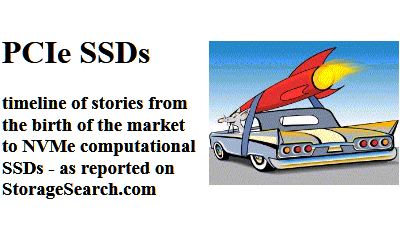|
Dell EMC, a part of Dell
Technologies, enables organizations to modernize, automate and transform their
data center using industry-leading converged infrastructure, servers, storage
and data protection technologies. This provides a trusted foundation for
businesses to transform IT, through the creation of a hybrid cloud, and
transform their business through the creation of cloud-native applications and
big data solutions. Dell EMC services customers across 180 countries –
including 98 percent of the Fortune 500 – with the industry's most
comprehensive and innovative portfolio from edge to core to cloud. |
See also:-
EMC
- mentions in StorageSearch.com and
EMC's SSD page
In
October 2015 -
Dell announced it would acquire EMC. EMC is now called Dell EMC.
after AFAs -
what's next?
who bought whom in SSD
hostage to the
fortunes of SSD
90%
of enterprise SSD companies have no good reasons to survive |
|
| .. |
EMC and the
Top SSD Companies List
by StorageSearch.com
EMC
launched its first flash SSD array based product in
January 2008.
This was simply a bunch of COTS SSDs in an HDD era
RAID box.
EMC
first entered the Top SSD Companies in
Q3 2010.
Highest
rank? - #15 in
Q1 2012.
Recent
rank? - #21 - in Q4
2016. |
| .. |
|
articles related to where EMC operates in the
SSD market:-
PCIe
SSDs
SSD software
the Fastest SSDs
re rackmount SSDs
acquisitions in the SSD
market
how
fast can your SSD run backwards?
Auto-tuning SSD Accelerated
Pools of storage
High availability
fault tolerant SSD arrays market
Decloaking
hidden segments in the enterprise for rackmount SSDs
Compared to
EMC... ours is better - can you take these AFA startups seriously? |
|
. |
 |
| . |
|
|
| . |
|
|
| . |
In
1987
EMC
introduced SSD storage for the mini-computer market, which was the
hottest part of the server market at that time. EMC's SSDs were 20x faster
than the then available hard disks. But market forces and losses led to EMC
exiting the "memory enhancement" business soon after.
... ...21 years later:- EMC
re-entered
the SSD market in January 2008
- with rackmount arrays populated by
flash SSDs from
STEC.
In Q3 2010 -
EMC entered the
Top SSD Companies -
researched and published by StorageSearch.com
In
October
2010 - Samsung
said it is shipping 200GB 3.5"
SATA SLC SSDs to EMC.
Sequential R/W speeds are 260MB/s and 245MB/s respectively. R/W
IOPS are
47,000 and 29,000. The new Samsung SSDs have an 'end-to-end
data integrity'
function and encryption.
In
January 2011
- EMC revealed it had
shipped 10 petabytes of SSD storage in 2010. To put that into context:- it's
equivalent to 10% of the enterprise SSD capacity shipped in the same
period by
SandForce
Driven partners and 2/3 of the enterprise SSD capacity shipped in the same
period by Fusion-io.
Most of EMC's flash in that period was SLC - whereas most of the flash shipped
by the other named vendors (and their channel partners) was lower cost MLC. For
enterprise flash types (SLC, eMLC etc) and market adoption see
sugaring flash
for the enterprise, while for petabyte SSD stories - see
this way to the
petabyte SSD.
In May 2011 -
EMC
announced
it has created a flash business unit and will enter the
PCIe SSD market later
this year. The company indicated that its run rate of shipping flash storage
array capacity in 2011 is approximately 3x the level it had achieved in
2010.
In February
2012 -
EMC
launched
its new PCIe SSD based product line - VFCache - which as widely reported last
month - leverages hardware designed by
LSI and incorporates
SandForce controllers.
In May
2012 -
EMC
announced
it has acquired XtremIO
for $430
million
In March 2013 -
EMC said it was sampling
flash arrays which are designed and managed using the
big SSD
controller architecture based on leveraging IP from its
acquisition of
XtremIO.
In
July 2013
- EMC
announced
it has agreed to acquire yet another
storage software
company - called ScaleIO.
In
November 2013
- EMC launched a
legal suit against Pure
Storage alledging that former EMC personnel had taken with them detailed
customer related market information.
In July 2014 -
EMC was named by
IT Brand Pulse as
"Innovation Leader" in the categories of
hybrid storage
appliances and also flash
system management software.
In January 2015 -
EMC said that its XtremIO
would be the fastest product they've ever done that hits a billion dollars a
year in revenue.
In October 2015 -
Dell agreed to
acquire
EMC for $67
billion. |
| ... |
|
Who's who in SSD?- EMC
by
Zsolt Kerekes,
editor - StorageSearch.com,
April 2013
To understand EMC's position in the SSD market today you
have to understand that - like many other leading enterprise companies at the
time - and
for
similar reasons - EMC failed to understand that what was happening in the
SSD market in the period 2003 to 2010 was significantly different to
what had
happened before.
For this and other reasons EMC wasn't engaged
at all in several significant SSD market transitions:- such as the switch
away from RAM SSDs to
the dominance of
flash SSDs in the enterprise, and neither did it play any active role in
the firm establishment of the
PCIe SSD market.
When EMC did start to react to customer demand for SSD arrays - its first SSD
systems in the modern era - launched in
2008 - fell
far below the performance
and efficiency
standards which had already been set by leading companies (at the time) in the
rackmount SSD market.
Learning
from its many early mistakes - which included walking away from the opportunity
to become one of Fusion-io's
first enterprise oem customers - EMC has - in the past several years - slowly
pieced together a business plan which has enabled it to operate adequately
within the SSD market as an
integrator, oem.
licensee and acquirer of raw SSD drives from a variety of primary sources
(listed in the article below).
While presenting to the world the
confident image that it will assimilate SSDs in the same way as it has other
past storage technologies - EMC has - like a duck paddling desperately
fast underwater - been rushing around behind the scenes to assemble a
credible sounding software and architecture strategy framework to pitch to its
customers as EMC's SSD vision for the future.
If the SSD market had
been a less disruptive market - then EMC's wrong footedness would have been more
damaging to its business prospects. But due to the anarchic state of the
SSD software market -
in which there was a
a gaping vacuum
of leadership from the anticipated sources even as late as 2012 - EMC -
despite not having a developed SSD product line of its own - was in fact in no
worse a state than many of the other companies it was used to competing with.
Here below is an earlier and longer version of my SSD market oriented
analysis of EMC - from May 2012 - followed by a timeline of key SSD related
activities re EMC
EMC is 1 of more than 100 companies in the
rackmount SSD market.
It also engages in these market segments:-
FC SAN SSDs,
iSCSI SSDs,
SSD software,
HA SSDs and
PCIe SSDs.
Many
of the leading SSD companies I talk to - which compete with EMC - are happy that
for many years EMC was a non-participant, and then a follower and integrator
of externally sourced SSD hardware rather than a leader in SSD architecture.
Uncompetitive SSD solutions from EMC were good for them.
Nevertheless - that doesn't stop many of these self same companies having wished
at one time or another than EMC would become a volume customer of their products
- or maybe even
acquire them. (EMC
acquired XtremIO - in
May 2012).
As the
SSD market has grown
bigger - EMC has been under increasing pressure to do something more
significant in the SSD market. As predicted EMC has been slowly solving its
SSD weaknesses and gaps using a combination of
oem deals,
licensing and acquisition - overlayed by promises of significant
SSD software in the
future. There was no big-bang quick-fix available that would work any better.
EMC
has oemed SSDs
from many leading SSD makers including:-
STEC,
Samsung ,
HGST,
LSI,
Micron and
Virident.
EMC formed a
flash business unit in May 2011 - but it wasn't until February 2012 that
the company launched its first PCIe SSD based products (Project Lightning)
which uses PCIe SSDs sourced from
LSI.
For more
info about EMC take a look at the links above and
EMC
- editor mentions in StorageSearch.com. |
. |
|
. |
| EMC samples XtremIO flash
arrays |
Editor:- March 5, 2013 - EMC today
announced
new models of PCIe
SSDs which the company claims offer nearly 60% better
TCO than (unnamed
competitors) due to new levels of
efficiency.
EMC's
XtremSF
half - height, half - length PCIe SSDs are currently available in
eMLC upto
2.2TB, while SLC models upto 1.4TB will ship in the 2nd quarter.
EMC
also said it's sampling flash
arrays which are designed and
managed
using the big
SSD controller architecture based on leveraging IP from its acquisition
of XtremIO.
Editor's
comments:- the industry has been anticipating flash SSDs which use
XtremIO's RAID busting
architecture.
Details are sketchy right now - but the
efficiency gains
from throwing away the old drive array design rulebook and starting again with
a flash foundation while at the same time having control of the complete
SSD software stack can
be impressive - as I learned last year talking to Rado Danilak
CEO of another leading company taking this approach -
Skyera.
Can
we expect EMC's flash array pricing to plunge down to Skyera levels?
That
will never happen - because EMC's business carries the legacy burden of too
many hard drives and too many old suits.
But what we could see
instead - is EMC's flash arrays coming down to a price point where the
customer pain is low enough to delay many of them from switching away to
other flash. Which means EMC could still have a future in the
solid state
storage business. | | |
. |
| EMC finally
does PCIe SSD launch |
Editor:- February 6, 2012 - EMC today
launched
its new PCIe SSD based product line - which as widely reported last month -
leverages hardware designed by LSI.
As
you'd expect - EMC say they plan to do a lot of things to support this with
their wrap around software protection (high availability, data integrity,
reliability, and disaster recovery) and
auto tiering / SSD ASAP.
And in the future they're going to do things even faster. Nothing to get
excited about then - unless you are a supplier to EMC.
EMC would like
to suggest that it was the first company to offer flash SSDs in an enterprise
storage array Their press release said - "VFCache is the latest in a line
of enterprise flash innovation firsts, beginning in 2008 when EMC was the first
to integrate flash drives into an enterprise storage array."
That's
an idiosyncratic reinterpretation of
SSD history.
In the interests of accuracy I would rewrite that to say - "EMC was
the 1st company to ship lonely flash drives in an EMC branded enterprise
storage array (which consisted mostly of hard drives)."
losers
from this?
I guess you can count
STEC as a loser -
because having been EMC's original flash SSD supplier (in other form factors)
they may have had some hopes that their late-to-market new PCIe SSD might get
its tires kicked.
I'm only saying this - because otherwise I'll get a
load of emails asking what I think - but in my view it would be a mistake to
count Fusion-io as a
loser in this.
FIO is the company which did most to establish PCIe
SSDs as a recognized and disruptive force in the enterprise market - and a year
ago upset EMC by disclosing it had shipped significantly more of its fast
ioDrive flash SSD capacity into the enterprise than EMC had done with its slower
STEC kind - despite EMC having had the prior advantage of a legacy tied
customer base.
I heard recently from someone who is no longer with the
company - that as you might expect for a fledgling company developing oem
opportunities - many years ago Fusion-io offered its PCIe SSDs as an oem
platform to EMC. Apparently EMC evaluated the ioDrive and poked around the
issue for months - but EMC was - at that time - "clueless" about the
potential of the SSD market couldn't understand what to do with it. | | |
| . |
|

| |
... |
| At the end of 2016 the SSD
market reached a dominant technology position where its products defined
everything important in the external computing environment. But innovation
hadn't stopped and the SSD market had already begun looking inwards towards the
memory space and outwards towards capturing data from a wider internet of
things. |
| the Top SSD Companies -
Q4 2016 | | |
| .. |
 |
| .. |
| Dell EMC
eols DSSD |
Editor:- March 3, 2017 - Dell EMC has end of lifed
the DSSD product line (an NVMe array and one of the
fastest SSD systems
in the market) and the
storyline
discussed in StorageReview.com
is the missmatch between Dell's high volume commodity business and this niche
HPC storage box.
The warm up to such an ending came in a
news
story in December 2016 by the
Register which revealed the $1 billion gap between the cost of
acquiring and developing the product and sales ($6 million).
Editor's
comments:- In the short term this is good news for
IBM's
FlashSystem
which is the most mature storage product line in this class.
And it's
good news for startups and other specialist SSD companies which engage with the
high performance end of the market.
One question I guess about the DSSD
product line is that the market which it might have been aimed at 3 years ago
doesn't exist any more.
Most computer companies who would be looking
for HPC storage of the NVMe array variety are easily able to produce such
systems from a competitive market of
2.5" NVMe SSDs.
So why pay a premium to EMC or anyone else?
But a more deep rooted
problem is that the DSSD is an old fashioned systems designer's prototype
implementation of a modern persistent memory box. And the nvm memory changes
in recent years (in cell technology and controllernomics tiering) makes the
design about as useful as a TTL minicomputer competing with an NMOS
microprocessor.
No matter how much cooling or SRAM you pack into a card
- the cheapest place to solve latency problems is in the semiconductor chip
itself before the data hits the external brake pads of the physical interface
to copper.
We're going to see a lot of different permutations of big
memory coming into the market. Generally the smaller the box and the closer it
is to the applications processor the less waste there is in intersystems
latency.
The DSSD approach has been blown away by commodity arrays at
the low end of its performance ramge and by genuine memory systems technology
advances at the high end.
Storage systems thinking can't compete for
performance with semiconductor integrated memory systems architecture.
And
here's another angle... Excelero
which exited stealth mode this month - whose software just blows away the DSSD
scalability while using COTS SSDs. | | |
| .. |
| "At the technology
level, the systems we are building through continued evolution are not advancing
fast enough to keep up with new workloads and use cases. The reality is that
the machines we have today were architected 5 years ago, and ML/DL/AI uses in
business are just coming to light,
so the
industry missed a need." |
| From the blog -
Envisioning
Memory Centric Architecture by Robert Hormuth,
VP/Fellow and Server CTO - Dell
EMC (January 26, 2017) | | |
.. |
 |
.. |
|
|
| .. |
Dell buys EMC - the SSD
view
good for Dell-EMC - long term
good for AFA and hybrid
competitors - short term
disruption and changes for SSD suppliers -
short term |
Editor:- October 13, 2015 - Dell yesterday
announced
it has agreed to acquire EMC
for approximately $67 billion. The acquisition also included EMC's stake in
the storage software
company VMware - which
will remain in public ownership.
Editor's comments:- In the
short term this fixes a problem for Dell (its weakness in enterprise storage)
and offers a credible way for EMC to adapt to a long term future in which its
storage products become
more
commoditized and accessible to smaller businesses (something which Dell has
historically been good at with its server business.)
The competitive
landscape in enterprise storage is
complex
but a long term SSD centric summary goes something like this.
Servers
have become a commodity. And there is little or no scope for genuine
competitive value
differentation options to be offered within the server market. (Being able
to offer the same memories or SSDs in servers as everyone else - does not
decommodify server product lines BTW.)
In contrast - enterprise storage
- which in the HDD and post tape library and post optical storage era (2001 to
2008) had been coasting towards oblivious commoditization - has been
temporarily reprieved from that fate (2009 to 2018) by the disruptive
impact of SSD memory technologies which enabled the construction of
5 to 6 role
differentiated types of new storage boxes which could deliver value to
users in ways which were technically unimaginable and unfeasible with
classically tiered memory and storage.
Having misfired its original
entry into the enterprise flash market in
2008 - EMC has
in recent years managed to accumulate credible industry leading proprietary IP
and product lines in 2 of the 5 above storage box segments (which will satisfy
projected enterprise storage needs in the post HDD era) meanwhile treading
water in the other 3 main box segments (indicating its aspiration to occupy
part of those other crowded beachheads if possible).
Assuming all goes
well with the acquisition process - the Dell-EMC product line will enable EMC
storage to be more competitive in the short term with existing products and to
maybe credibly add another notch to the list of product types for which it has
aspirations for clear leadership.
But the
acute
efficiency pressures
on the server and storage markets which are emerging from
SSD centric software
and data architectures will mean that traditional product lines from both
vendors will shrink away.
And those lost revenues will stay gone
forever. The old ways and the
old purchase
orders won't be coming back. That's why it's important for both companies
to draw in new smaller customers and to nurture them (if possible) into the
new sustainable sold state storage and server product lines.
What
about impacts for the SSD market?
Anyone who competes with Dell or EMC
will - for the next year - have an easier ride - due to the inward focus
which sucks away the attention of the talent following such acquisitions.
The
SSD market as a whole will continue to supply memory and SSDs to the new company
- and probably can look forward to getting more business in 18 months time.
But
it won't simply be more of the same. Some SSD vendors may see big changes
when Dell EOLs systems and modules which are cannibalistic and compete within
the combined product lines.
Related comments:-
"This
transaction comes out of weakness, not strength" said Scott Dietzen, CEO -
Pure Storage
- in his blog
Purely
Observations on Dell / EMC Deal.
The aptness of
that summary made me jealous.
I guessed that Scott Dietzen has
probably got some old product planning powerpoints somewhere which could
provide many entertaining viewing hours about the competitive landscape
analysis which focuses around this old style pair of soon to be married
storage competitors.
So my comment to Dietzen's article post on
linkedin was this.
re - "This transaction comes out of weakness,
not strength" - is a profound understatement. Wish I'd written that.
See also:-
| | |
| .. |
|
|
| .. |
| EMC's flash educational
video |
Editor:- I've been saying for years that any
simple analysis - like my enterprise
silos model - makes it clear why no single flash product (or supplier)
can economically satisfy all requirements.

The
first idea is graphically encapsulated in a video
by EMC which they call "FLASH in a flash."
This video
also introduces a smart and almost apologetic way of positioning
hard drive based
storage - as being for applications which can "tolerate multi
milli-seconds latency".
That's clever - because they know most
of you already have these HDD systems, and EMC is best known for these slower
rotating storage systems. That's how they get you to lower your guard by
introducing the familiar.
The 2nd half of the video - which is not so
good as a general flash video - suggests that EMC is the best supplier to look
at because it's got 25 years experience in storage.
In my view that
argument doesn't logically follow.
Experience in something that's
so very
different is irrelevant. It's like suggesting that breeding horses would
have made Ford
better at designing engines.
Nice try by EMC marketing at subtle SSD
sales sophistry by linking irrelevant concepts though. | | |
| ... |
|
|
| .. |
|
| .... |
|
| |






